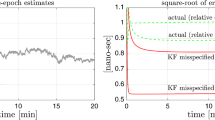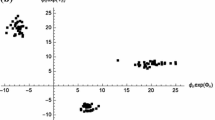Abstract
The traditional Kalman filter can be viewed as a recursive stochastic algorithm that approximates an unknown function via a linear combination of prespecified basis functions given a sequence of noisy samples. In this paper, we generalize the algorithm to one that approximates the fixed point of an operator that is known to be a Euclidean norm contraction. Instead of noisy samples of the desired fixed point, the algorithm updates parameters based on noisy samples of functions generated by application of the operator, in the spirit of Robbins–Monro stochastic approximation. The algorithm is motivated by temporal-difference learning, and our developments lead to a possibly more efficient variant of temporal-difference learning. We establish convergence of the algorithm and explore efficiency gains through computational experiments involving optimal stopping and queueing problems.
Similar content being viewed by others
References
Barto A, Crites R 1996. Improving elevator performance using reinforcement learning, Adv Neural Inf Process Syst, 8:1017–1023.
Bellman R, Dreyfuss S 1959. Functional approximations and dynamic programming, Math Tables Other Aids Comput, 13:247–251.
Benveniste A, Métivier M, and Priouret P 1991. Adaptive Algorithms and Stochastic Approximations. Berlin Heidelberg New York: Springer-Verlag
Bertsekas DP 1995a. Nonlinear Programming. Athena Scientific.
Bertsekas DP 1995b. Dynamic Programming and Optimal Control. Athena Scientific.
Bertsekas DP, Singh S 1997. Reinforcement learning for dynamic channel allocation in cellular telephone systems. Adv Neural Inf Process Syst. MIT, vol. 9, p. 974.
Bertsekas DP, Tsitsiklis JN 1995. Neuro-Dynamic Programming. Athena Scientific.
Borkar V 1995. Probability theory: an advanced course. Berlin Heidelberg New York: Springer-Verlag
Boyan J 1999. Least-squares temporal difference learning. Proceedings of the Sixteenth International Conference (ICML) on Machine Learning, pp. 49–56.
Boyan J 2002. Technical update: least-squares temporal difference learning, Mach Learn, 49(2):233–246.
Bradtke SJ, Barto AG 1996. Linear least-squares algorithms for temporal-difference learning, Mach Learn, 22:33–57.
Choi DS, Van Roy B 2001. A generalized kalman filter for fixed point approximation and efficient temporal-difference learning, proceedings of the international joint conference on machine learning.
Dayan PD 1992. The convergence of TD(λ) for general (λ), Mach Learn, 8:341–362.
de Farias DP, Van Roy B 2000. On the existence of fixed points for approximate value iteration and temporal-difference learning, J Optim Theory Appl, 105(3).
Gurvits L, Lin LJ, and Hanson SJ 1994. incremental learning of evaluation functions for absorbing markov chains: New Methods and Theorems, preprint.
Karatzas I, Shreve SE 1998. Methods of Mathematical Finance. Berlin Heidelberg New York: Springer.
Lagoudakis M, Parr R 2001. Model-free least-squares policy iteration. Neural Inf Process Syst (NPIS-14).
Nedic A, Bertsekas DP 2001. Policy evaluation algorithms with linear function approximation. Tech. Rep. LIDS-P-2537, MIT Laboratory for Information and Decision Systems, December 2001.
Pineda F 1997. Mean-field analysis for batched TD(λ), Neural Comput, 1403–1419.
Sutton RS 1988. Learning to predict by the method of temporal differences, Mach Learn, 3:9–44.
Tadić V 2001. On the convergence of temporal-difference learning with linear function approximation, Mach Learn, 42:241–267.
Tesauro G 1995. Temporal difference learning and TD-gammon, Communications of the ACM, 38(3).
Tsitsiklis JN, Van Roy B 1997. An analysis of temporal-difference learning with function approximation, IEEE Trans Automat Contr, 42:674–690.
Tsitsiklis JN, Van Roy B 1999. Optimal stopping of markov processes: Hilbert Space Theory, approximation algorithms, and an application to pricing high-dimensional financial derivatives, IEEE Trans Automat Contr, 44(10):1840–1851.
Van Roy B 1998. Learning and value function approximation in complex decision processes, Ph.D. dissertation, MIT.
Van Roy B, Bertsekas DP, Lee Y, and Tsitsiklis JN 1999. A Neuro-dynamic programming approach to retailer inventory management, Proc. of the IEEE Conf Decis Contr.
Varaiya P, Walrand J, and Buyukkoc C 1985. Extensions of the multiarmed bandit problem: the discounted case, IEEE Trans Automat Contr, 30(5).
Warmuth M, Forster J 2000. Relative loss bounds for temporal-difference learning. Proc. of the Seventeenth International Conference on Machine Learning, pp. 295–302.
Warmuth M, Schapire R 1997. On the worst-case analysis of temporal-difference learning algorithms, Journal of Machine Learning, 22(1,2,3):95–121.
Zhang W, Dietterich TG 1995. A reinforcement learning approach to job-shop scheduling. Proc. of the International Joint Conference on Artificial Intellience.
Author information
Authors and Affiliations
Corresponding author
Additional information
This research was supported in part by NSF CAREER Grant ECS-9985229, and by the ONR under Grant MURI N00014-00-1-0637.
Rights and permissions
About this article
Cite this article
Choi, D., Van Roy, B. A Generalized Kalman Filter for Fixed Point Approximation and Efficient Temporal-Difference Learning. Discrete Event Dyn Syst 16, 207–239 (2006). https://doi.org/10.1007/s10626-006-8134-8
Published:
Issue Date:
DOI: https://doi.org/10.1007/s10626-006-8134-8




